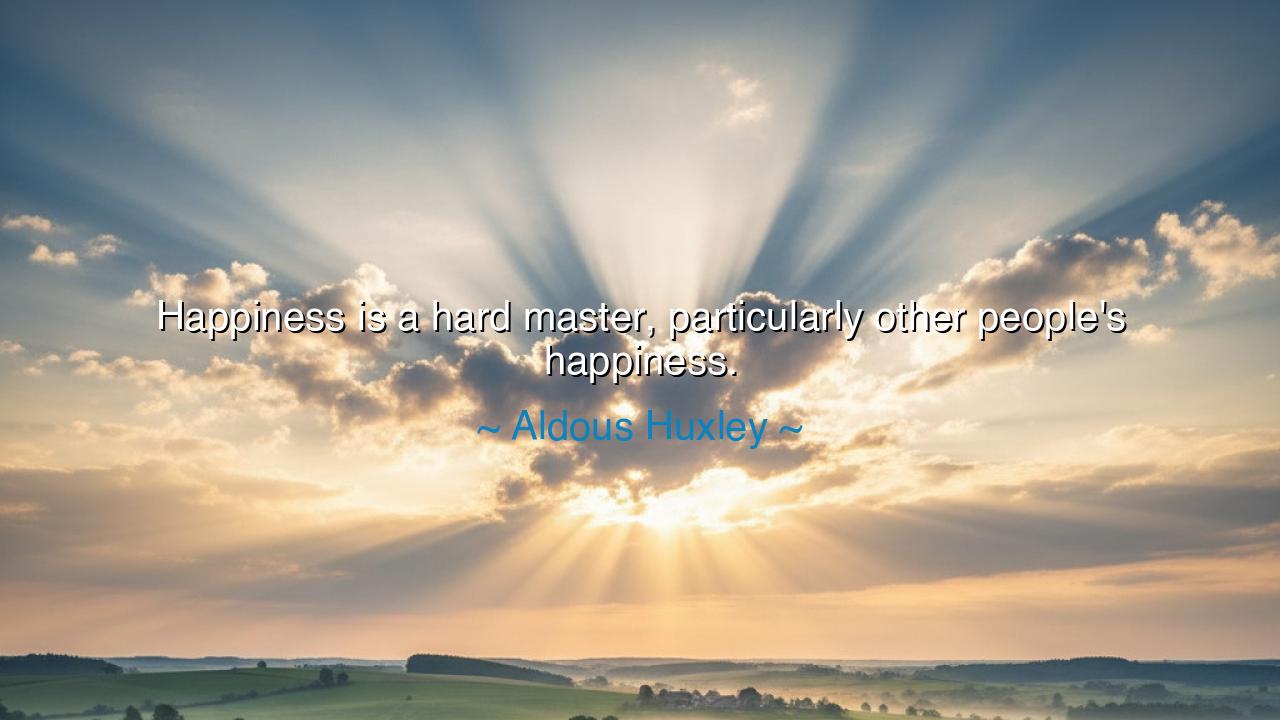
Happiness is a hard master, particularly other people's






In the deep musings of Aldous Huxley, the philosopher and dreamer who peered into both the light and shadow of the human soul, we find this solemn truth: “Happiness is a hard master, particularly other people’s happiness.” This saying, though gentle in sound, strikes like a bell across the chambers of the heart. It reminds us that joy, though sweet, is not easily governed—and when it belongs to others, it becomes an even harsher ruler. For to live in pursuit of another’s happiness is to walk a narrow path between love and surrender, generosity and self-erasure.
In every age, humankind has bowed before the idol of happiness. We seek it as sailors seek land, and when we believe we have found it, we build our lives around it like worshippers before a sacred flame. But what Huxley saw, in his wisdom and weariness, is that this flame burns as easily as it blesses. Happiness, like fire, gives warmth but demands fuel—and too often, that fuel is our own peace, our own sense of worth, sacrificed in the name of pleasing others.
Consider the tale of Antigone, daughter of Oedipus, who sought to honor both her brother and the law. In trying to serve the peace of her kin and the will of her king, she found herself torn in two. Each act of devotion brought sorrow to another; each attempt to create happiness sowed the seeds of grief. This is the burden of those who would live for others—the heart becomes a battlefield where the desires of the world wage war against the quiet voice of the soul. Antigone’s tragedy was not that she lacked love, but that her love demanded what the world could not give: a perfect harmony of duty and joy.
So too, in our own time, do we find ourselves enslaved by the happiness of others—the approval of a parent, the smile of a lover, the peace of a child. We labor to keep their light shining, even as our own flickers. We confuse service with self-denial, forgetting that the well from which we give must itself be full. Huxley’s warning is not against love, but against losing oneself in it. For when we make the contentment of others the measure of our worth, we build our souls upon shifting sands.
True happiness, both ours and theirs, cannot be commanded or manufactured. It is not a prize to be won through effort, but a guest that visits when the heart is honest. The wise do not chase the joy of others, nor do they chain their own peace to another’s mood. Instead, they practice compassion without captivity—offering warmth, yet keeping the hearth of their spirit tended. To give light, one must remain a flame.
There is a story of a teacher who once told his students, “You cannot make another happy if you are drowning in their sorrow.” He had spent his youth carrying the burdens of others—listening, comforting, sacrificing—until he awoke one day hollow and voiceless. Only when he learned to care for his own heart did his compassion regain its strength. Thus he taught: love others, but not at the cost of your own soul. For if you burn yourself to keep others warm, soon there will be no fire left for anyone.
And so, children of tomorrow, take this lesson from the ancient wisdom hidden in Huxley’s words: do not become the servant of happiness, for it is a master that cannot be pleased. Serve instead the truth of your heart. Help others to find joy, but do not chain yourself to their storms. The path of peace is not found in pleasing everyone, but in walking rightly—doing what love requires, not what approval demands.
When the night is long and the world’s expectations weigh heavy, remember: the purpose of your life is not to make everyone happy, but to live with integrity, compassion, and presence. For these are the roots from which real happiness—your own and others’—will quietly grow. And when you find it, cherish it, but never kneel before it. For happiness, as Huxley warned, must serve the heart, not rule it.






AAdministratorAdministrator
Welcome, honored guests. Please leave a comment, we will respond soon